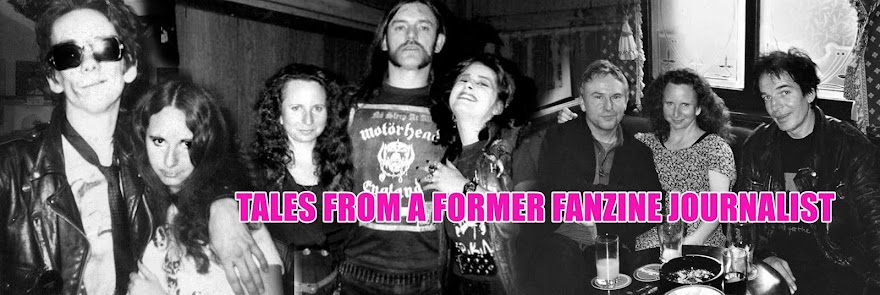By Devorah Ostrov
 |
The Dead Boys circa 1980 lineup: (L-R) David Quinton,
George Cabaniss, Stiv Bators, and Frank Secich
Photo: Vicki Berndt
|
Watching the newly re-formed Dead Boys climb out of their car in front of San Francisco's Warfield Theater before their slot on Urgh #1, it wasn't hard to see that the previous lineup of scrappy punks was gone forever, having been replaced by nice-looking rock and roll boys. Even Stiv, the only original member left, looked surprisingly clean!
 |
| Me & Stiv at Aquarius Records - 1977 Photo: Devorah Ostrov |
And even after rolling around in slime for an hour onstage, Stiv proved to be a real swell guy, quick with rude answers to innocent questions...
IW staffer Lindsey: "Do you have a lot of spare time?"
Stiv: "Why? Whatcha got in mind?"
Life wasn't always this easy though. When Stiv Bators, Cheetah Chrome, Jimmy Zero, Jeff Magnum and Johnny Blitz first got together in Cleveland back around 1975, it was tough to find work.
"The Ramones weren't around then or anything," says Stiv. "It was like pre-punk. Back then, you had to dress like an 'English fag glitter band' and play Aerosmith songs."
Determined to get a gig, the group that would become the Dead Boys did just that. Calling themselves Frankenstein, they dressed up like the New York Dolls and played on Halloween for a goof.
"The Ramones weren't around then or anything," says Stiv. "It was like pre-punk. Back then, you had to dress like an 'English fag glitter band' and play Aerosmith songs."
Determined to get a gig, the group that would become the Dead Boys did just that. Calling themselves Frankenstein, they dressed up like the New York Dolls and played on Halloween for a goof.
 |
The group that would become the Dead Boys is hardly recognizable
in this photo that Stiv sent to Rock Scene's "New Bands" section. |
But according to Stiv, the glitter gimmick paid off. "We did 'Sonic Reducer' and 'Down in Flames' [both were included on the Dead Boys' first LP] and some people liked the music, so after that, we got to play certain places."
 |
Stiv Bators backstage at the Warfield - 1980
Photo: Vicki Berndt
|
Stiv adds, "Then the Pistols came out right after that, and they hit the press before we did. That's always been our problem; we always hit the press too late."
They released two albums, but a combination of bad timing and the near-fatal stabbing of drummer Johnny Blitz led to the break-up of the group in 1979. Then, a few months later, it was announced that Stiv was going to LA "to sing pop."
 |
Flyer for Urgh #1 at the Warfield Theatre featuring Magazine,
Pere Ubu, the Members, and the Dead Boys - August 15, 1980
|
 |
The Dead Boys at the Old Waldorf in 1977
Photo: Devorah Ostrov
|
So, what's Stiv's real lifestyle like? "I sit at home and drink warm milk at night while watching Father Knows Best reruns," he smirks. ✥
Circumstantial Evidence: Frank Secich's autobiography (published in 2015 by High Voltage Australia) presents a candid look at the longtime rocker's storied past, including untold tales of his rock 'n' roll journey with Blue Ash, the Dead Boys, Stiv Bators Band, Club Wow, and his current outfit, the Deadbeat Poets.
Filmmaker Danny Garcia has recently completed the first cut of his documentary feature, Stiv: The Life And Times Of A Dead Boy. The film (which incorporates archive footage, photographs, music and interviews with Stiv's friends and fellow musicians) is scheduled for release summer 2018. Garcia's previous rock 'n' roll documentaries include Looking For Johnny, The Rise And Fall Of The Clash, and Sad Vacation: The Last Days Of Sid And Nancy.
* You can read my other interviews with Stiv here:
Lords Of The New Church: Hanging Out On Portobello
Stiv Bators: Two Extraordinarily Candid Interviews


